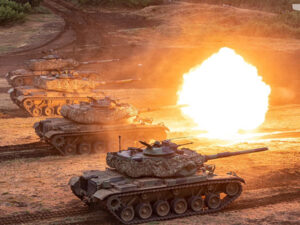
FILE PHOTO: Chinese and Taiwanese flags are seen through broken glass in this illustration taken, April 11, 2023. REUTERS/Dado Ruvic/Illustration/File Photo
Taipei [Taiwan], July 9 (ANI): Amid daily Chinese provocations in Taiwan, Ministry of National Defense (MND) has decided to invest in the mass production of domestically designed loitering munitions, also known as “kamikaze drones,” Taiwan News reported.
This move comes after the ministry determined that the number of similar weapons purchased from the United States was insufficient to adequately defend against a potential invasion by China.
On June 18, the US State Department announced that it had approved the sale of 720 Switchblade 300 Anti-Personnel and Anti-Armor Loitering Missile Systems and 291 ALTIUS 600M-V Unmanned Aerial Vehicles to Taiwan.
However, according to a military source, with the increasing Chinese military threat, an internal assessment concluded that the number of various attack drones provided by the US is still insufficient for Taiwan’s defense needs, Taiwan News reported, citing Liberty Times.
Therefore, Taiwan will also boost its military capabilities by launching mass production of domestically designed attack drones. The MND plans to include funding for the production of Type-1 and Type-2 kamikaze drones in its 2025 budget.
Additionally, the mass production of Chien Hsiang anti-radiation drones, aimed at enhancing sea and air combat capabilities, is expected to be completed next year.
The National Chung-Shan Institute of Science and Technology (NCSIST) is also reportedly working on performance improvements for the Chien Hsiang series.
The upgraded versions are expected to be produced in small batches and included in the regular annual budget.
According to the source, the Chien Hsiang drones can target and attack enemy radar stations and shipborne radars, while the Type-1 and Type-2 drones will mainly be used by troops for anti-armor missions.
The Type-1 drone, developed by the National Chung-Shan Institute of Science and Technology (NCSIST), is designed for individual soldiers and shares similar specifications with the Switchblade 300. It features quick deployment and easy operation, with a flight time of approximately 15 minutes and a guided control range exceeding 10 kilometers.
The Type-2 has a longer flight time than Type-1. The Type-2 can conduct beyond-visual-range reconnaissance and strikes using imagery, infrared, and microwave systems for targeting.
The system offers flexible and mobile launch methods, including multi-launch devices for swarm attacks that can be mounted on ships or vehicles. (ANI)


















